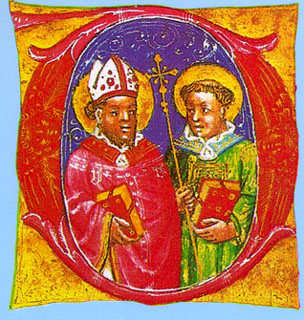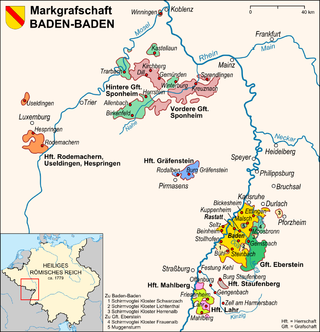
Year 530 (DXXX) was a common year starting on Tuesday of the Julian calendar. In the Roman Empire, it was known as the Year of the Consulship of Lampadius and Probus. The denomination 530 for this year has been used since the early medieval period, when the Anno Domini calendar era became the prevalent method in Europe for naming years.

Denis of Paris was a 3rd-century Christian martyr and saint. According to his hagiographies, he was bishop of Paris in the third century and, together with his companions Rusticus and Eleutherius, was martyred for his faith by decapitation. Some accounts placed this during Domitian's persecution and incorrectly identified St Denis of Paris with the Areopagite who was converted by Paul the Apostle and who served as the first bishop of Athens. Assuming Denis's historicity, it is now considered more likely that he suffered under the persecution of the emperor Decius shortly after AD 250.

Germain was the bishop of Paris and is venerated as a saint in both the Catholic Church and the Eastern Orthodox Church. According to an early biography, he was known as Germain d'Autun, rendered in modern times as the "Father of the Poor".

Venantius Honorius Clementianus Fortunatus, known as Saint Venantius Fortunatus, was a Latin poet and hymnographer in the Merovingian Court, and a bishop of the Early Church who has been venerated since the Middle Ages.

Rastatt is a town with a Baroque core, District of Rastatt, Baden-Württemberg, Germany. It is located in the Upper Rhine Plain on the Murg river, 6 km (3.7 mi) above its junction with the Rhine and has a population of around 50,000 (2011). Rastatt was an important place of the War of the Spanish Succession and the Revolutions of 1848 in the German states.

Cecilia of Sweden, was Princess of Sweden as the daughter of King Gustav I and his second wife, Margaret Leijonhufvud, and Margravine of Baden-Rodemachern as the wife of Christopher II, Margrave of Baden-Rodemachern. She is the most famous daughter of Gustav I, known for a courtship scandal in connection with a sister's wedding and for a lengthy stay in England under Elizabeth I where her first child was born.

Radegund was a Thuringian princess and Frankish queen, who founded the Abbey of the Holy Cross at Poitiers. She is the patron saint of several churches in France and England and of Jesus College, Cambridge.
A sequence is a chant or hymn sung or recited during the liturgical celebration of the Eucharist for many Christian denominations, before the proclamation of the Gospel. By the time of the Council of Trent (1543–1563) there were sequences for many feasts in the Church's year.

Saint Hermagoras of Aquileia is considered the first bishop of Aquileia, northern Italy. Christian tradition states that he was chosen by Saint Mark to serve as the leader of the nascent Christian community in Aquileia, and that he was consecrated bishop by Saint Peter. Hermagoras and his deacon Fortunatus evangelized the area but were eventually arrested by Sebastius, a representative of Nero. They were tortured and beheaded.

Edward Fortunatus of Baden was Margrave of Baden-Rodemachern and Baden-Baden.
Felix is a given name that stems from Latin felix[ˈfeːliːks] and means "happy" or "lucky". Its other form is Felicity.

October 13 - Eastern Orthodox liturgical calendar - October 15

The Margraviate of Baden-Baden was an early modern southwest German territory within the Holy Roman Empire. It was created in 1535 along with the Margraviate of Baden-Durlach as a result of the division of the Margraviate of Baden. Its territory consisted of a core area on the middle stretch of the Upper Rhine around the capital city of Baden, as well as lordships on the Moselle and Nahe.

Margrave Philip II of Baden was from 1571 to 1588 Margrave of the Margraviate of Baden-Baden. He was the son of the Protestant Margrave Philibert of Baden-Baden and the Catholic Mechthild of Bavaria.

December 13 - Eastern Orthodox liturgical calendar - December 15
Venancio, Venâncio (Portuguese), Venanzio (Italian) or Venantius (Latin) is a masculine given name. Venâncio is also a Portuguese surname. It may refer to

Saint Felix of Nantes (514-584) was a 6th-century Bishop of Nantes, France. He is venerated as a saint in the Catholic Church.
Januarius usually refers to St Januarius, bishop of Benevento or Naples.

The Yburg is a ruined hilltop castle atop the Yberg, on the western edge of the Black Forest near Baden-Baden, in southwestern Germany.
This page is based on this
Wikipedia article Text is available under the
CC BY-SA 4.0 license; additional terms may apply.
Images, videos and audio are available under their respective licenses.













